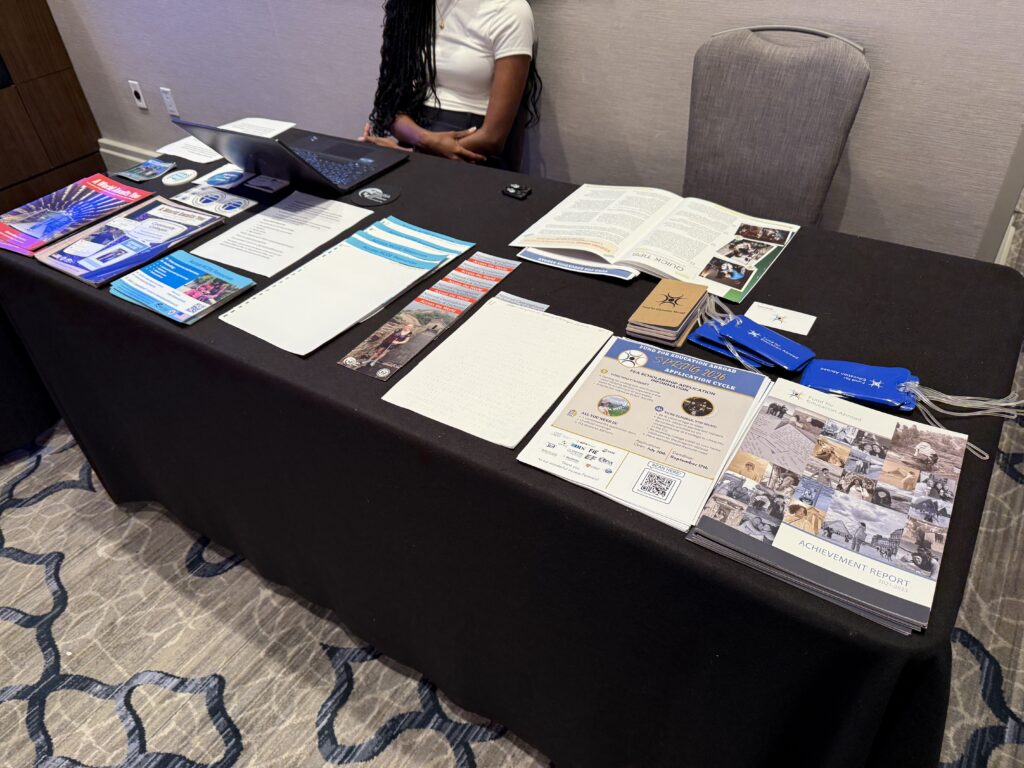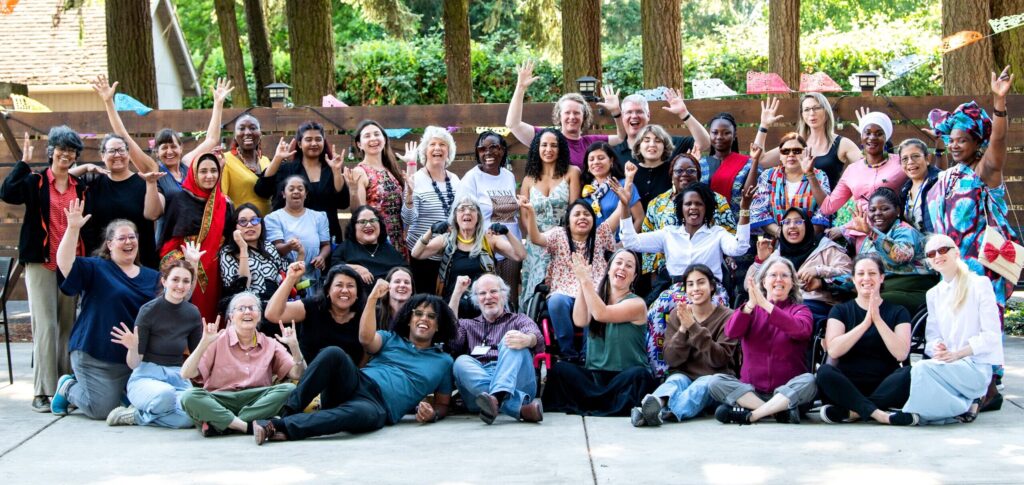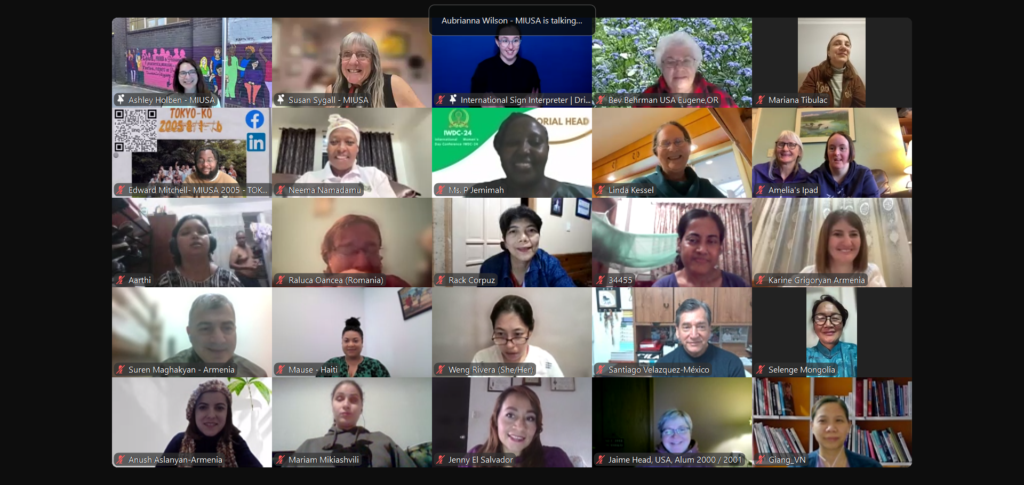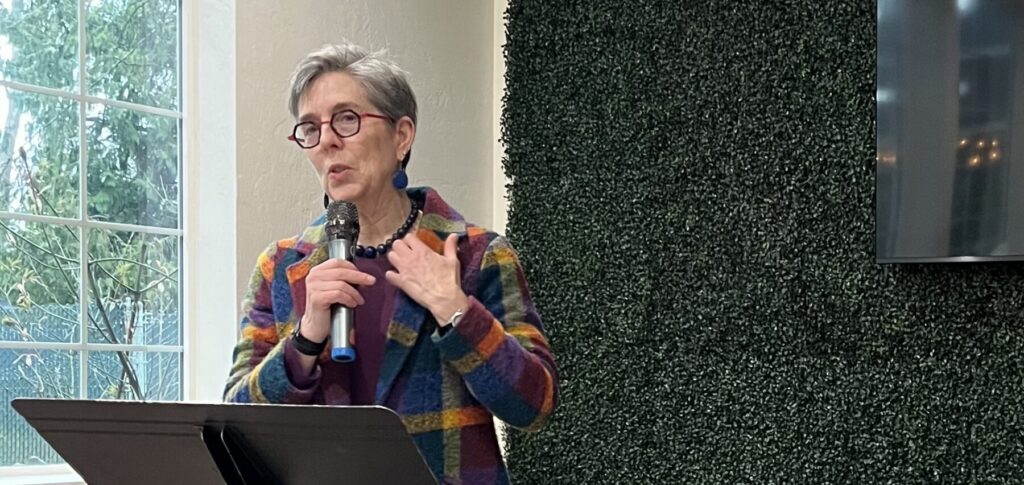We were a group of 15 teenagers and young adults with disabilities, five student assistants, and two adults from the USSR’s State Committee on Physical Culture and Sports and Adventure Club.
The invitation came from Mobility International USA and passed to Adventure Club, as there were no organizations or associations at the time to represent people with disabilities in the USSR. CEO of Adventure Club Dmitry Shparo found and put together a mixed group from different Soviet republics.
The journey started with bringing wheelchairs up the steep stairs by hand at Sheremetyevo Airport and then carrying our travelers to wheelchair-inaccessible restrooms on the plane — an eye-opening reality for many of us. But once we landed in Oregon, the situation changed. Room numbers and elevator buttons had Braille signage, ramps and lifts for wheelchairs, and audible crosswalks. There was also accessible hiking, rafting, rope courses, volleyball, waterskiing, and more!
What did it teach us? What do we remember? How did this journey change our perspectives and lives? Who have we become?
Three decades later, I dove deep into Internet water to try to find those participants and see what they think today.
It wasn’t too hard to find Ruslan Lopatiuk online. Ruslan was part of the USSR national team for volleyball among the deaf, and in 1990 he graduated from the Moldavian College of Physical Culture and Sports. In 1991, he enrolled in the Institute of Physical Education and Sports. In the same year, the Sports Federation of the Deaf of Moldova was created, where Ruslan was elected the first President of this organization and worked in this position until 2004. In 2004, he was offered the position of Vice President of the Society of the Deaf of the Republic of Moldova. In 2009, Ruslan was elected President of the Society of the Deaf of the Republic of Moldova, where he works to this day.
I contacted his office, and Ruslan immediately responded, saying that he also had the idea to find all of us again and what an unforgettable experience it was. Ruslan has a beautiful wife and a little daughter, 8.
Irina Kukoleva and I shared a room at our host family house in Oregon. With big eyes and an athletic body, she looked like a model. Irina has a hearing disability, and her love of swimming led her to become a coach for other deaf swimmers. A great coach, according to the online reviews of her grateful students.
Irina also adores dogs! I remember how she played with Jerry, a little black dog of our host father Hayden Hodges. For 25 years, Irina and her husband trained and bred Spaniels. A cancer survivor, today she manages to balance both of her careers.
Irina told me that for a while she stayed in touch with Larisa Styrta, who was raised in Kyiv and has cerebral palsy. Later, Larisa got married and moved away. I am not giving up on finding her…
I found the phone number of Andrei Zvezhinsky, a visually-impaired person from Belarus, on WhatsApp. I left him a voice message and immediately got a response. “It’s amazing! Just two days ago I was searching online for Adventure Club!” he said. It was great to hear his voice!
Andrei told me that he is married with three sons – Bogdan, 21; Stepan, 14; and Grigiry, 7 years old. The oldest is at Cambridge University, studying physics and mathematics and is one of the best in his class. This is no surprise at all, as his father, Andrei, was the best in school at his time! The younger sons are also very smart and good students. One wants to be a doctor; the youngest is a future engineer-architect. Andrei is very proud of them.
Luckily for me, Oleg Shevkun was on Facebook. He is a senior radio host at Radio Theos, an independent Christian interfaith conversational radio station in Moscow. He is very involved in discussions about the blind community in Russia. He is happily married and has two daughters and a son. His older daughter Kristi lives in California and is getting married soon. We spoke about the possibility of getting together in Los Angeles and maybe even going to Eugene!
Oleg also told me that in early 2000 he saw Shukur Memedov in Moscow who came to enroll in the Moscow Art Institute to become a musician. I remember how he spent all his pocket money to buy a Yamaha keyboard, and how happy he was to have an instrument with which he can make a living. I haven’t found him yet, but I’m looking.
Oleg stayed in touch with Nigar Hashimova, a wheelchair rider who lives in Baku and works as a translator for the Ministry of Education of Azerbaijan. I called Nigar, and we talked about our lives and how inspiring that trip was for all of us. Nigar is very intelligent and extremely pleasant. After returning back from Eugene, Nigar organized an association for the international cooperation of people with disabilities. She visited Eugene and MIUSA two more times: once in 1992 under a leadership program with a group from the CIS, and in 1994, when she brought her group of disabled and non-disabled students under an exchange program. In 1995, Baku hosted the American group and Nigar opened her home for an American girl who uses a wheelchair. Later she worked for the Gender Center, which addresses issues of women with disabilities.
Nigar told me that the situation in Baku improved a lot:
“It’s not like in the United States or in the European Union, but by far better than in the Soviet period. A number of major international events were held in the country, and they also contributed to making the environment more accessible. The new public buildings are being built according to the international standard now, so there are ramps and elevators. I am happy that I played my part in these changes. Now, when I see young girls in wheelchairs, I hope that it’s easier for them today than it was for me, and I think I can take a little credit for that.”
Nigar wishes she could do more, but in 2001, her mother had a stroke, and today Nigar focuses on her mother’s health.
Goga Kokhreidze, a wheelchair user in Georgia was one of the hosts of the 1991 American group visiting Russia and Georgia. As I learned in my online research, Goga is now a leader of “Coalition for Independent Living” and “Accessible Environment for Everyone” in Tbilisi, an international law specialist, and a former member of the Parliament of Georgia.
Olga Mokhova of Saint Petersburg always had so much energy that it seemed that she would jump out of her wheelchair and run any minute! Always enthusiastic, engaging and happy, she could light up any room!
On that trip she became friends with Artem Antashev, a non-disabled man from Moscow. They always hung out together, always laughing. They were very cute together. In Russia, it was almost unheard of for a young man to fall in love with a girl in a wheelchair – not to mention they were from different cities.
Artem graduated from nursing school and worked in a hospital. He and Olga kept in touch though. And then, after years of their long-distance relationship, despite all obstacles, Olga and Artem got married. They traveled the world together and had a beautiful daughter, who is now 22 and soon getting her master’s degree in Psychology.
Sadly, four years ago, Artem got very ill and passed away. “We had a great life together and created many good memories,” Olga assured me. Her strong and cheerful voice told me that she is doing well and loves her work at Edible Arrangements, where they make fruit basket gifts. She invites us to visit her in Saint Petersburg. Irina Kukoleva and I already took her invitation and we are definitely going!
Stas Kostyashkin, who was part of the supporting team and hails from Moscow, continued working at Adventure Club for a while. In 1997 he founded a successful corporate travel company called Continent-Express, which has divisions in Moscow and Saint Petersburg. In 2010 his love for adventures prompted him to join an expedition around the North Pole on the Northern Sea Route. Stas loves his three kids – Anastasia, 22, Kirill,10 and Martha, 8 – who travel and go on expeditions with him. Kirill and Stas even went up to the highest mountain in Europe, Elbrus.
Vitaly Makarenko was only 17 when he joined our small supporting team on the trip, but you could always rely on him. After our return, Vitaly was heavily involved in the first two wheelchair marathons in Russia in 1991 and 1992, which were organized by Adventure Club. These marathons were strenuous: the first went 870 miles, the entire route on wheelchairs, from Moscow to Kiev to Kryvyi Rih. The second was much longer – 6,835 miles over six months, from Vladivostok to Saint Petersburg. Three finalists were invited to the Kremlin and received the Order of Courage from President Boris Yeltsin. It brought a lot of attention and sparked honest conversations about the situation of persons with disabilities. In Dmitry Shparo’s book about these marathons, Vitaly talks about our trip to America as one of the first seeds that inspired him.
“I am very proud that we were at the very beginning of positive changes for wheelchair-users in Russia,” Vitaly said softly.
A few years after working on the marathons, Vitaly had to face his own challenge. His first son, Rustam, was born without a right hand. Vitaly had to prove once again, to his own family, that he is a man that you can rely on. Vitaly raised his son well and Rustam became a champion of Moscow and champion of Russia in para-swimming. Today Vitaly spends a lot of time with his younger son, Danyar. They often go camping and fishing together.
After helping Stas to build his company, Lena Burova, part of the supporting group from Moscow worked for various companies and now found her way in Human Resources for Schneider Electric. She loves her son, Danila.
Lena said that she has kept her favorite shirt with the Mobility International USA slogan, “Challenge yourself and change the world!” Lena shared that during tough times, she often looked at this slogan, and it helped her to get through difficult situations.
As for myself, I, Alexandra Samoilova (supporting group, Moscow) continued my work at Adventure Club for a couple of years, survived cancer and, despite the prohibitions of doctors, had a child. Then I got my Master’s and moved to Los Angeles to explore a different world and provide more lifelong opportunities for my son, Konstantin. My son graduated from UCLA and became a Peace Corps Volunteer in Georgia, where he taught English, creative writing and journalism to high school and university students. I am very proud of his achievements and goals.
I teach Russian in Beverly Hills Lingual Institute and work at the Getty Museum. I also work with seniors, immigrants from different parts of the world to adapt to the US, teaching them English, computers and American culture.
I see people with disabilities in my classes and at the museum every day, and I always make sure they are treated right. They are not limited. They don’t have to be limited. As Lena Burova wrote about our society in her diary in 1990:
“I realized that it’s us who limit their capabilities. Psychologically, by treating them like disabled, and physically, creating all sorts of barriers on the way to fully function.”
I can’t agree more. Thank you, Susan Sygall and everyone at Mobility International USA, for making us realize that.






Manage Your Privacy